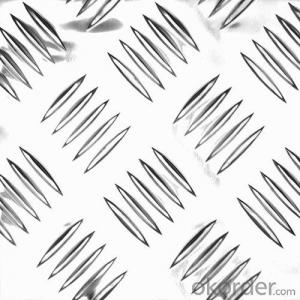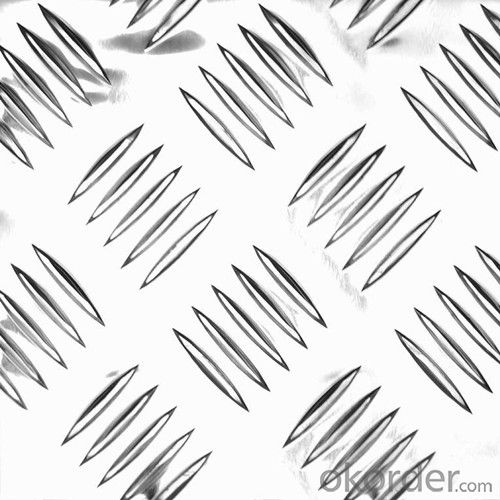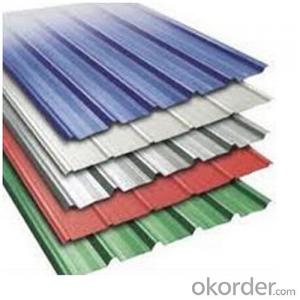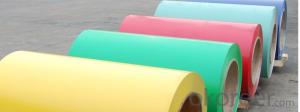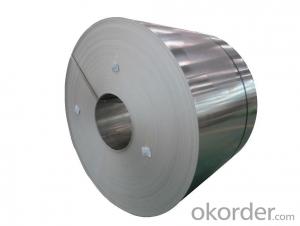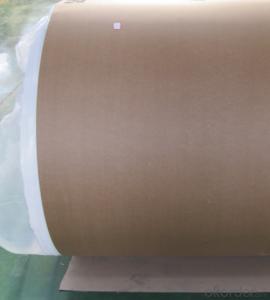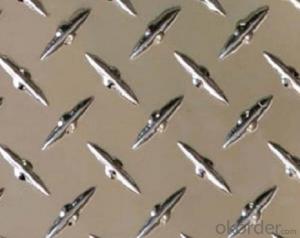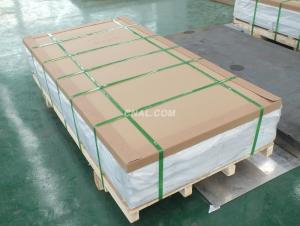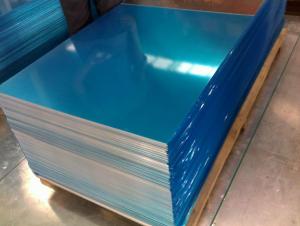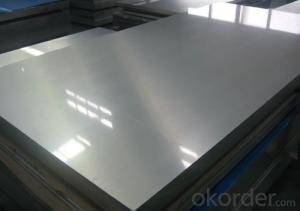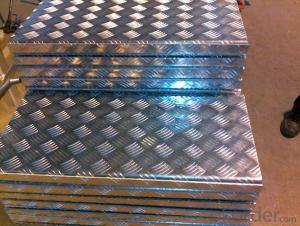16 Gauge Thick Checkered Aluminium Sheet-AA1XXX
- Loading Port:
- China Main Port
- Payment Terms:
- TT OR LC
- Min Order Qty:
- -
- Supply Capability:
- -
OKorder Service Pledge
Quality Product, Order Online Tracking, Timely Delivery
OKorder Financial Service
Credit Rating, Credit Services, Credit Purchasing
You Might Also Like
Product Description:
1. Specifications of Aluminum Checkered Sheet
| MAIN SPECIFICATION OF ALUMINUM CHECKERED SHEET | |
| Alloy | AA1XXX (AA1050, AA1060, AA1070, AA1100 etc.) |
| AA3XXX (AA3003, AA3004, AA3005, AA3105 etc.) | |
| AA5XXX(AA5052) | |
| Temper | H14,H18,H24, H26, H32 |
| Thickness | 0.2mm-100mm |
| Width | 30mm-1700mm |
| Standard | GB/T 3880-2006 |
| Special specification is available on customer's requirement | |
2. Usage/Applications of Aluminum Checkered Sheet
The embossed aluminum sheet are widely used for decorative purposes in construction, packing and appliance. It is also very commonly used for anti-splippery purposes in vehicles and public places.
3. Packing & Delivery of Aluminum Checkered Sheet
Packaging: Seaworth package
Shipment: The goods will be delivered in not more than 40 days after getting the buyer's payment.
- Q: What is made when Aluminium and Hydrochloric Acid reacts? It makes a dense white smoke with a metallic odour in the gas. Could it be dissolved amounts of Aluminium Chloride or small amounts of unreacted Aluminium in the gas? Or could be that the Chlorine (in equilibrium with HCl and HClO) made chlorates and perchlorates of aluminium that give off odours?Don't tell me the gas isn't supposed to have an odour. I know what diatomic Hydrogen smells like. Nothing. That's the way it should be. But unfortunately, that's not the way it is.
- i might call the plumber immediately. curiously there's a hollow interior the piping someplace, and the sulfuric acid would desire to have eaten by in spite of advance into clogging that hollow. I doubt that it will supply up leaking via itself, to no longer point out that acid is in all risk leaking into your kitchen in the present day.
- Q: What are the limitations of using aluminum sheet?
- There are several limitations associated with using aluminum sheet in various applications. Firstly, aluminum is a relatively soft metal compared to other options such as steel or titanium. This means that it is more susceptible to scratches, dents, and deformation under heavy loads or impacts. Therefore, it may not be suitable for applications that require high strength or resistance to damage. Secondly, aluminum has lower thermal conductivity compared to other metals. This can be a disadvantage in applications where efficient heat transfer is crucial, such as in heat exchangers or cooling systems. Thirdly, aluminum is prone to corrosion. Although it has a natural oxide layer that provides some protection, it can still corrode in certain environments, especially in the presence of moisture or acidic substances. This limits its use in applications where corrosion resistance is vital, such as marine or chemical industries. Additionally, aluminum is a relatively expensive material compared to other options. Its production and extraction processes require significant energy and resources, contributing to higher costs. Therefore, it may not be the most cost-effective choice for some applications. Lastly, aluminum has limited compatibility with certain substances. It can react with certain chemicals, resulting in degradation or contamination. Therefore, it may not be suitable for applications where it will come into contact with substances that can cause adverse reactions. Overall, while aluminum sheet has numerous advantages such as its lightweight nature, good electrical conductivity, and ease of fabrication, it is important to consider its limitations when selecting it for specific applications.
- Q: Are aluminum sheets suitable for electrical enclosures?
- Yes, aluminum sheets are suitable for electrical enclosures. Aluminum is a lightweight and durable material that offers excellent electrical conductivity and corrosion resistance, making it an ideal choice for protecting electrical components. Additionally, aluminum's thermal conductivity helps dissipate heat generated by the enclosed equipment, ensuring proper functioning and longevity.
- Q: Can aluminum sheets be used in food packaging?
- Yes, aluminum sheets can be used in food packaging. Aluminum is a common material choice for food packaging due to its excellent barrier properties, durability, and ability to maintain the freshness and quality of food products. It is also lightweight, recyclable, and resistant to moisture, odors, and UV light.
- Q: Are aluminum sheets suitable for signage applications?
- Yes, aluminum sheets are highly suitable for signage applications due to their durability, lightweight nature, and ability to withstand various weather conditions. They are also easy to customize, making them a popular choice for both indoor and outdoor signage.
- Q: How do you prevent galvanic corrosion when using aluminum sheets with concrete?
- To prevent galvanic corrosion when using aluminum sheets with concrete, it is essential to use a barrier or protective coating between the aluminum and concrete surfaces. This can be achieved by applying a suitable paint, epoxy coating, or a non-conductive membrane to isolate the aluminum from direct contact with the concrete. Additionally, using corrosion-resistant fasteners made of stainless steel or other compatible materials can further prevent the occurrence of galvanic corrosion. Regular inspections and maintenance are also crucial to identify and address any potential corrosion issues promptly.
- Q: This question asks for a comparison of aluminum sheets with other common materials used in building insulation, focusing on their properties and performance.
- <p>Aluminum sheets are lightweight and have excellent thermal conductivity, which can be both an advantage and a disadvantage in insulation. They reflect heat well, making them useful in radiant barrier applications, but they are poor insulators as they do not trap heat. In contrast, materials like fiberglass, cellulose, and mineral wool have lower thermal conductivity and are more effective at reducing heat transfer. These materials are better at insulating as they trap air, which is a poor conductor of heat. Foam insulation, such as polyurethane and polystyrene, also offers good thermal resistance due to their closed-cell structure. Overall, aluminum sheets are not typically used as primary insulation but can be effective in specific applications where heat reflection is desired.</p>
- Q: Our production needs a large number of plating aluminum plate, consult domestic and imported aluminum plate difference?
- Guangdong Huayuan prosperous is the largest aluminum plate supplier 021-56808701, in Shanghai / Tianjin / Chongqing have logistics and storage, domestic aluminum plating surface coating treatment is less than imports, stamping coating is easy to fall,
- Q: What is the thickness range available for 101 aluminum sheets?
- The thickness of 101 aluminum sheets can differ depending on the manufacturer and supplier. Typically, these sheets come in various thicknesses, ranging from 0.016 inches (0.41 mm) to 0.25 inches (6.35 mm). It is crucial to mention that this range does not encompass all possibilities, as there might be alternative thickness options or customizable choices depending on specific needs or preferences.
- Q: Are aluminum sheets suitable for automotive heat shields?
- Yes, aluminum sheets are suitable for automotive heat shields. Aluminum is a lightweight and highly conductive material, making it an excellent choice for heat management in automotive applications. It has a high melting point and good thermal conductivity properties, allowing it to effectively absorb and dissipate heat generated by the vehicle's engine, exhaust system, or other heat sources. Additionally, aluminum sheets are easy to shape and form into various sizes and designs, making them versatile for different automotive heat shield applications. Overall, aluminum sheets provide a cost-effective and efficient solution for protecting sensitive components from heat damage in automotive systems.
Send your message to us
16 Gauge Thick Checkered Aluminium Sheet-AA1XXX
- Loading Port:
- China Main Port
- Payment Terms:
- TT OR LC
- Min Order Qty:
- -
- Supply Capability:
- -
OKorder Service Pledge
Quality Product, Order Online Tracking, Timely Delivery
OKorder Financial Service
Credit Rating, Credit Services, Credit Purchasing
Similar products
Hot products
Hot Searches
Related keywords
